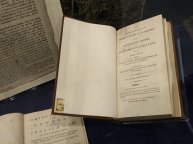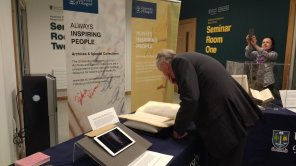Historical Conversations kicked off in the Kelvin Hall, University of Glasgow on 19 September 2017.

In conversation with Dr. Catriona Macdonald, Reader in Late Modern Scottish History, Historiographer Royal T.C. Smout delighted the audience with a discussion of his stellar career in the academy, as well as the influences that shaped his work. One innovative aspect of the night was the use of ‘pop-up’ perspex boxes to showcase primary source material held in University of Glasgow Library, Archives and Special Collections in collaboration with Moira Rankin, Senior Archivist. This blog provides a write-up of the sources, by Dr. Catriona Macdonald.
Professor T.C. Smout: ‘ane to draw and wreat the cronicles of the tymes’
Professor T.C. Smout is H.M. Historiographer Royal in Scotland: a position that dates back to 1649. A graduate of the University of Cambridge (Clare College, 1956), he began his academic career in Scotland in 1959, in the Department of Economic History at the University of Edinburgh where he became Professor in 1970. Landmark texts from these years include Scottish Trade on the Eve of Union (1963), and A History of the Scottish People (1969) – a book that arguably changed the complexion of Scottish history forever. Between 1979 and his formal retirement in 1991, however, Smout occupied the chair in Scottish History at the University of St Andrews – the university with which he is most fondly associated. Here, Smout published a sequel to his History with A Century of the Scottish People (1986) and much else besides. Retirement did not curtail his innovative studies in Scottish history. In the last twenty five years Smout has led the way in developing interdisciplinary approaches to the environmental history of Scotland – methodologies and approaches exemplified in his 2012 publication with Mairi Stewart The Firth of Forth, An Environmental History. Tonight we ask him to look back on the challenges and opportunities that faced Scottish history at the end of the twentieth century, when social history chimed with the politics of class in the north; when economic history proved how de- and re-industrialisation had patterned the past as well as the present; and when questions of Scottishness fuelled constitutional debate. We ask him also to gaze forward: what questions ought historians to be asking in 2017, and where might they find the answers?
In 2003 Smout published People and Woods in Scotland: a history and two years later was co-author of A History of the Native Woodlands of Scotland (2005).

His recent publications alert us to the fact that our environment (land, sea and air) has a past and ought to have a history commensurate with its complexity and capacity to endure. He has done more than any other to cast doubt on myths associated with the ‘Great Wood of Caledon’, for example: in their place, he points to how human intervention has been a persistent influence even from pre-Roman times.
In recent years Smout has revisited a theme he has written about throughout his career: agrarian change. In his article in the Scottish Historical Review, ‘A New Look at the Scottish Improvers’ (April 2012), edited by his interviewer tonight and former student, Catriona Macdonald, Smout emphasised how wide spread interest in improvement was in the long eighteenth century. This was no mere passing aristocratic fashion but energised generations of ambitious Scots of all classes.
Debates regularly fuel history, and Smout has been central to a good many of them. His debate with former colleague, Professor Chris Whatley, on the serfdom of the Scottish colliers is illustrated here. Throughout, Smout has proved to be a generous scholar, admiring challenging perspectives and thorough empirical research.

One of his earliest publications, Smout’s Scottish Trade on the Eve of Union (1963) highlighted important questions regarding Scotland’s reliance on trade with England that generated heated discussion in the early eighteenth century and were to be an important feature of debates about Scottish independence in 2014. Smout highlighted that even before the Union of 1707,

Scotland’s trade with England was considerable: such research served to highlight just how well placed fears were in Scotland of the crippling consequences of import duties and sanctions should union be rejected.
A major debate in which T.C. Smout participated with Chris Whatley related to questions of Scottish radicalism (‘inflammability’). Riot and disturbance marked periods of shortage and acute social change, but – in comparison to other nations – what did it amount to?
Smout’s landmark volumes (A History of the Scottish People and A Century of the Scottish People) placed Scots front and centre.

Smout’s approach addressed Scots of all classes as individuals, as family members, as workers, as members of communities. It was a perspective that sat easily with the ‘history from below’ that was breaking new ground in England and Wales. But Smout also highlighted distinctive stories in the north – lives determined by differences in social welfare, mapped by contrasting town planning conventions. and condemned to poverty by a low wage economy. In Smout’s vision of tenement Glasgow, there was always washing hanging, children squabbling and, alas perhaps, too many dreams thwarted.
Summary by Catriona Macdonald and the Historical Collections Team
The Historical Conversations strand of the Centre’s seminars will be summarized on their blog, which can be found by following the link below:


[…] astute choice of subject with which to kickstart environmental history’. It is here that Smout ‘led the way’, establishing in 1992 the University of St Andrews’ Institute of Environmental History – […]